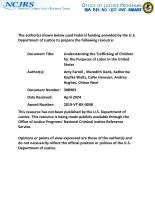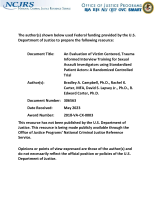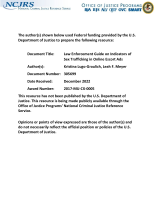Victim advocates
Prosecution of Spouse Abuse - Innovations in Criminal Justice Response
Sexual Assault Legislation - An Implementation Study
Sexual Assault Legislation - An Implementation Study Executive Summary
Responding to Intimate Partner Violence Related Strangulation Integrating Policy, Practice, and Rese
This webinar examines the problem of Intimate Partner Violence Strangulation and an innovative response policy. The presentation will include an overview of the nature and extent of strangulation, its dangers, and adverse medical consequences followed by a review of a Strangulation Ordinance in Burleson, Texas that mandates extensive training for first responders and a city-wide response protocol for strangulation detection and investigation, documentation of strangulation signs and symptoms, medical assistance, and service referrals for strangulation survivors.
See the YouTube Terms of Service and Google Privacy Policy
MDI Myth: Talking with Decedent's Families is Simple and Routine






